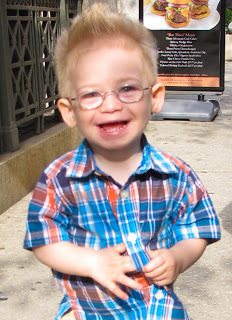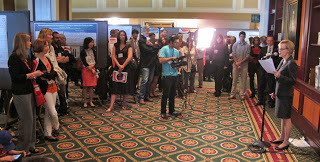John Elder Robison's Blog, page 16
August 25, 2011
Ten Days in Australia

A scene from Travels With My Dad, fifty years ago in Kodachrome. Somewhere in the Western United States . . . .
I am pleased to present my schedule for Australia, beginning next week. I've corresponded with so many of you via email, FB and a blogger over the years. I'm looking forward to seeing some of you in person.
Thursday 1 September 2011 - Melbourne
9:15 AM Interview
- Radio National Life Matters (live)
11:00 AM Interview
- Radio Australia (taped)
1:00 PM Interview
- Qantas Up & Away Radio (taped)
7:00 PM Melbourne
Writer's Festival Author Reception
North
Fitzroy Star Corner Newry Street and St Georges Road N Fitzroy
Friday 2 September 2011 - Melbourne
9:30 AM Interview
- The Circle
11:00 AM Network
Ten
2:00 PM Interview
- Radio 4BC
2:30 PM 4BC
Radio 77 Southgate Avenue Cannon Hill QLD 4170
9:00 PM MWF
Event - Friday Night Live
10:30 PM BMW Edge
Cnr Swanston and Flinders St Melbourne VIC 3000
The Festival's
Late Show, hosted by the peerless Julia Zemiro (RocKwiz) in Letterman mode.
Live music, festival guests, no safety net. Tonight, Julia's joined by Lynda La
Plante, John Elder Robison, Simone Felice, Rachel DeWoskin and Casey Bennetto.
Saturday 3 September 2011 - Melbourne
2:30 PM MWF
Event - Writing from the Autism Spectrum
ACMI
Cinema 1, Federation Square, Cnr Flinders and Swanston Streets, Melbourne VIC
Sunday 4 September 2011 - Melbourne
4:00 PM MWF
Event - In Conversation: John Elder Robison
The
Cube, Federation Square, Cnr Flinders and Swanston Streets, Melbourne VIC
Tuesday 6 September 2011 - Perth
9:00 AM Interview
- 720 ABC Afternoon Program in Perth
7:00 PM University
of Western Australia Event - Be Different: adventures of a free-range Aspergian
Venue: UWA
Extension - University Club, Stirling Highway, Crawley, Perth WA 6009
Link for
booking tickets: http://uwa.interticket.com/info.php?e...
Thursday 8 September 2011 - Brisbane
7:00 PM Brisbane
Writers Festival - Festival First Night (Optional)
Auditorium
1, State Library of Queensland
Festival
First Night includes the Official Opening by The Minister for Finance, Natural
Resources and the Arts, Rachel Nolan; Opening Address by Ann Patchett; and
performances by Shane Koyczan and Voices of Birralee - Birralee Blokes.
Friday 9 September 2011 - Brisbane
11:00 AM BWF
Event - Aspergers: Difference and Disability
Venue:
Auditorium 2, State Library of Queensland
Panellists:
John Elder Robison Chair: Guy Coaldrake Description: John Elder Robison, a guy
with Asperger's syndrome, shares entertaining and meaningful stories about
learning to cope with problems. He demonstrates that many Aspergians possess
unique gifts and emerge from the shadow of disability to lead full lives.
Saturday 10 September 2011 - Brisbane
1:00 PM BWF
Event - God Bless Humanity!
Venue:
Breezeway, Maiwar Green
Chair:
Krissy Kneen Panellists: John Elder Robison, Cathrine Ann, Dave Bidini
Description: John Elder Robison and Cathrine Ann transformed their own lives to
become 'seemingly' normal and successful. Dave Bidini knows the power of sport
to transform lives. These three writers discuss humanity at its best with
Krissy Kneen.
(c) 2007-2011 John Elder Robison

Published on August 25, 2011 19:24
August 15, 2011
Autism in theFamily - more common than we thought

This
morning I read a striking a new study which addressed the
question of autism in siblings – how common is it? The findings will be of vital interest to
many; most especially young families with an autistic infant.
Earlier studies and "conventional wisdom" suggested the
incidence of autism in siblings was in the 3-10% range. This new study shows those numbers to be very
far from the mark.
Overall, scientists found autism in 19 percent of the younger
siblings. However, the incidence is
higher in families with two or mote autistic kids. In that case, a new sibling's chances of
being autistic rose to more than 32 percent.
Being a boy makes a difference too. "Only" 9% of girl siblings were autistic, as
compared to 26% of boys. I found this
difference quite interesting because I often wonder if autism is
under-diagnosed in females. In this
study, all the kids were screened with the gold-standard ADOS or ADIR tests
prior to age three. So even with
top-notch screening, we still have more autistic boys.
Those are some strikingly high percentages. As high as they are, and knowing autism is a
spectrum condition, I have to wonder how many non-diagnosed siblings will
eventually turn out to have less severe but still noticeable "differences."
There were a few more points I found interesting. First of all, the IQ of the child did not
predict anything. Neither did severity
of autism, as defined by the ADOS diagnostic scales. So your odds of having a second autistic kid
are higher, but those odds and knowledge of the first kid don't combine to give
any insight into how a second kid might end up.
The conclusion is inescapable:
autism does run in families.
According to these findings, the more autistic kids you have, the more
you are likely to keep having.
We talk about autism having both genetic and environmental
components. This study, with 664 infants
distributed all over the country, shows a very powerful genetic component. That certainly does not diminish the role of
environment, but it's sobering.
I predict the results of this study will have a profound impact
on family planning, because it casts parents' chances of having a second or
third child with autism in a strikingly different light that any previous study.
We already know (from other studies) that many parents stop
having children when their child receives an ASD diagnosis. This new finding may significantly reinforce
that tendency.
Read the study yourself at this link
The study involved 664 infants from 12 U.S. and Canadian
sites, evaluated as early as 6 months of age and followed until age 36 months. Kids with previously identified autism-related
genetic factors such as Fragile X were excluded from the study group
"It's
important to recognize that these are estimates that are averaged across all of
the families. So, for some families, the risk will be greater than 18.7
percent, and for other families it would be less than 18.7 percent," said Sally
Ozonoff, Ph.D., professor of psychiatry and behavioral sciences at the MIND
Institute and the study's lead author. "At the present time, unfortunately, we
do not know how to estimate an individual family's actual risk."
This
study was based on data from the Autism Speaks High Risk Baby Siblings Research
Consortium (BSRC) and led by investigators from the UC Davis MIND Institute.
Your
correspondent (John Elder Robison) is a member of the Science Board of Autism
Speaks, one of the groups who funded the work.
(c) 2007-2011 John Elder Robison

Published on August 15, 2011 09:04
June 23, 2011
Discrimination

The continuing discussion about my thoughts on
discrimination and accommodation got me to thinking . . .
I am absolutely in favor of laws that make it illegal to
fire people for being gay, Jewish, black, or anything else except
incompetent. That's discrimination, and
it's wrong.
I do my best to live that way, myself. That means I do my best to treat every person
who walks in the door of my company the same way, regardless of race, religion,
sexual orientation, or whatever. I
really don't care about those things. If
someone is nice, I try to be nice. If
they are nasty, I throw them out.
I suspect my own Asperger's makes me oblivious to many of
the differences in people that are allegedly the basis for discrimination
elsewhere. Therefore it would be more
accurate to say I have no idea if a person is gay or straight (unless they say
so) than it would be to say I treated them the same because they were one way
or the other. However, I don't know if I
would be any different even if I knew.
The differences ethnic/racial/sexual differences others may remark on
generally do not matter much to me.
But that's just me. I
think other people have a right to their opinions, even if I disagree with
them.
For example, I also believe in an employer's right to let
someone go if he does not fit in with that person's team. That, to me, is the essence of what we call
employment at will, a management tenant which prevails in the USA. In a small group, everyone has to fit
together, and you inevitably have situations where one person does not fit,
even though they may be technically competent.
I don't think it's wrong to let someone go, in that
circumstance. My company is small, with
a dozen employees. One person with a bad
attitude can drag everyone down in a little place, and I think it's wrong to
force us to tolerate the person.
So what if the reason the person doesn't fit is that they
have autism? That makes it a hard
question. I don't know if a blanket
answer for that circumstance exists, at least for me.
Being a large white heterosexual male, I am one of the least
likely sorts to suffer discrimination.
The only time I really felt discriminated against was when I worked
briefly in a Japanese-run company, where it was made abundantly clear that
people like me were lesser animals.
Finding that attitude among engineers was shocking at the time, but I
know many other folks experience the same thing every day.
So what did I do? I
left.
As much as I favor laws against discrimination, I am
realistic enough to know laws don't change how people feel. If my co-workers don't like me for some
reason, I have never been inclined to force my fit in an organization. I don't want to be where I am not wanted.
I feel like fighting discrimination often places the fighter
in the role of being a victim. That is
the essence of the thing . . . someone done me wrong, and I want to change the
world so they cannot do it again. In
that role, one is powerless, and hoping to gain power. While discrimination fighters have accomplished
great things, I feel like I want to act in a more immediately positive way in
my own life. That means I support the
fight against discrimination but I choose a path where I am accepted, because
that make me feel ok right now.
In my world view, when someone does me wrong, I change the
circumstances of my life so they cannot do it again. My focus is on me, and what I can change in
myself or my life circumstances. Those
are the only things really under my control
When I express this view, some autistic people say it's easy
for me, because I have always been able to find work. That's true.
I am lucky that way. What do I say
to someone who stays in a job where they are disliked for being who they are,
yet they are terrified they cannot find another job?
I don't know what to say to that. I have always been so stubborn that I have
not been able to stay. Even when I had
no place to land, I always jumped. I did
that in music, cars, electronics jobs, and even publishing. It's always worked. By worked, I mean I have always been able to
find a new and better direction.
One consequence of my recent essays is that I've been
criticized for suggesting that people in a minority group (like autistics, 1%
of the population) are more likely to achieve success in nypical society if
they make certain changes to fit in.
I think I've made it clear how we may change to fit in while
still being true to ourselves and out values.
That does not mean I think society should not be more
accepting. Of course I favor greater
acceptance. I'm just trying to be
realistic. I can't make other people
change. I can only change myself. So that's what I advocate.
I'd be interested in other views on this.
(c) 2007-2011 John Elder Robison

Published on June 23, 2011 20:17
June 16, 2011
Accomodation
Should we change, or should others change for us? Should workplaces change for us?
We (by we, I mean anyone) must be able to present ourselves in such a way that
the people we engage think we are nice/interesting/capable or whatever they
need to continue the interaction. If we
fail to do that, we will not move forward in a relationship with that person. That may mean we don't make a friend, or we
don't get a job, or we don't get admitted to a school. Whatever it is, it's a lost opportunity.
Obviously no one can succeed with every engagement of
another person, but each of us must look at our total tries, and our success
rate. If the success rate is low, we
have to ask ourselves why.
In my last post, I talked briefly about Asperger people who
fail to get jobs for whatever reason, and then allege discrimination. Some neurodiversity voices ask for an end to
that discrimination, and for greater acceptance.
I have asked for greater acceptance myself. I think that is a noble goal, but not one we
will see attained anytime soon. When I
look at how I was treated in childhood, how my 21-year old son grew up, and
what I see today I see some change but not much. It leads me to wonder how much acceptance and
accommodation we might reasonably expect.
I think what happens is that the philosophical desire for
more broadminded treatment flies in the face of evolutionary human
development. We have thousands of years
of experience that tells us a person acting a certain way is a bad person; a
threat. We are conditioned to reject
people who exhibit those behaviors. What
are those behaviors, you ask? There is no single, simple answer. We just seem to be programmed to pick up
certain unspoken cues and interpret them that way.
The problem folks like me have is that our Asperger's causes
us to exhibit innocent but non standard behaviors that get interpreted as bad. I've written on this before, urging people to
think twice when a person says or does something unexpected. I think that works in some situations,
especially with people who are exposed to kids with differences or AS in the
family. For the great majority of people, though, the message does not get
through or it gets ignored.
That's why I say we are 1% of the population and we can't
expect the other 99% to change for us.
Laudable as the goal of change may be, they just don't care. Note than I am not saying the 99% are normal
and we are abnormal. I understand the 99% have many issues of their own. I'm just observing that the odds are stacked
very heavily against us, when it comes to getting them to change in all their
collective diversity, indifference, ignorance, and whatever else.
What about discrimination?
I won't say there are not people who discriminate against autistic
people. I'm sure there are. That said, when we fail to get a job or make
a friend, I still maintain that failure usually stems from our behavior
(unexpected or unacceptable), and not from arbitrary discrimination against the
underlying cause (Asperger's.)
I cannot control what other people think about "my kind." Prejudice or discrimination is something I
cannot change, and frankly, I would not want to do it for my benefit through
force of law. Why? Because if someone does not want me around,
that is enough. I am out of there. I am not going to stay where I am not wanted.
I want to be in control of my life. That means I work on changing my behavior as
needed to fit in. I have full control of
my actions, so I know success is achievable for me by that route. I don't wait around for others to change, because
that is frustrating and often unsuccessful.
What about accommodation for sensory issues? Several people asked my thoughts on
that. Examples might be moving to a
quieter work cubicle, or getting different lighting. I think many sensory accommodations are
reasonable and doable for employers. I
am absolutely in favor of any subtle changes in the workplace that make folks
like us more comfortable.
At the same time, I recognize that kind of accommodation has
its limits. If the accommodation would
require major changes in the workplace, and that same workplace is acceptable
to everyone else, I'd get a different job.
But that's just me. Through my
life I have chosen to vote with my feet in situations like that. Others would fight for change and I can
respect that, even though I would not do it myself.
In our society, we have chosen to let government dictate the tradeoffs by which some people are inconvenienced for the benefit of people with disabilities. An example of that would be handicap parking spaces. By having those spaces we allow those who need them to access facilities they could not otherwise visit. But the non-handicapped person who needs a space pays a price for that accommodation even as it sits unused and he has nowhere to park.
Disability rights advocates fight those battles on many fronts. I applaud their efforts and successes, but I do not wait for such accommodations to improve my own life. Since I want action now, I make my own way as best I can. That is the sometimes hard reality we all face, every day. We can hope and work for societal change, but we still have the chance to make the best of the life we have today, because today will never come again and I don't want to spend it waiting. I want to be acting.
(c) 2007-2011 John Elder Robison

Published on June 16, 2011 08:24
June 15, 2011
Some thoughts about the Steve Silberman interview

A couple of weeks ago my friend Steve Silberman posted an excellent
interview of me which attracted some deserved criticism with respect to my
responses. I would like to address some of the points of that interview here.
*
Silberman: Are there any ways that society could be reformed
to make it a more comfortable and supportive place for autistic adults?
Robison: I don't think that's a realistic question, Steve.
We represent one percent of the population. Asking what 99 percent of the world
should do to make it a better place for that one-percent member --- that's
verging on science fiction and fantasy. People who get into that way of
thinking become militant about demanding their rights and thinking about what
the world owes them. Frankly, I don't think the world perceives that they owe
us one single thing.
If you're a guy with severe autistic disability and you
can't talk, you cry out for compassion by your very existence. It's obvious
when people look at you and listen to you. If you're a person in a wheelchair,
nobody can reasonably argue that you should just get your ass across the
street. But when you're a person like me and your disability is principally
with social functioning, and at the same time you have good language skills,
people are going to dismiss you as a jerk if you don't learn to fit in. That's
the hard truth. To suggest that someone like me should ask for accommodations
is, in my opinion, setting that person up for failure. Because when your
language skills are good, there's no external sign of disability, and you act
weird --- and then you make demands on people for how they ought to change to
accept you? That's a non-starter.
*
People were troubled by my response in that passage, but I believe it
remains essentially true, however unpleasant it may seem to people. Remember, I am not saying I think this is how
things should be. I am saying this how I
believe our society works, like it or not.
If you look and sound "normal," indeed if you present
yourself as intelligent and articulate (like many Asperger people) you are
going to have a hard time asking people who don't know you for special
accommodation.
They are going to look at you and say, Why? You look normal to me.
If, on the other had, you have some visible disability,
people are cued that they need to be open to different expectations for how you
might act or what you might need.
I'm not suggesting people will take pity on us, or respond on
that basis. I am simply suggesting that visible evidence of disability sets the
stage for a wide variety of accommodations, freely given. Taking pity on us has nothing to do with
that, though other people may or may not feel that way.
When I suggested that some people perceive us as jerks when
we say inappropriate things, I am not passing judgment on those people. I am simply repeating what has been said to
me by countless folks on the spectrum, and others who have interacted with
them, successfully or not. You may not
feel comment that applies to you, and if so, that's great. Just remember that a defining characteristic
of Asperger's is a difficulty in reading the unspoken messages of other people,
and that deficit naturally leads to misunderstandings, some of which will
inevitably be interpreted wrong by the other parties.
Then we had this exchange . . .
Silberman: But other minority groups have demanded
reasonable accommodation from society, such as laws against discrimination in
the workplace. Black folks did it by launching the civil rights movement, many
other disabled groups have done so, and gay people --- like your brother
Augusten --- have done it, too.
Robison: The race thing is completely different. You can
look at someone and right away know if they're black or white. There's been a
huge gay rights movement, but look at what there is already for gay
accommodation. I don't think there was ever an issue of people refusing to hire
gay people in most workplaces.
Silberman: Well, that isn't true. I'm not trying to argue
with you ---
*
OK, I don't know what I was thinking when I there was never
an issue about hiring gay people. I was totally wrong. Certainly there are people who say, I won't hire gay workers just as
there were people who said I wouldn't hire black people, or no Jews allowed
here.
And indeed that sort of thinking surely still exists but
it's against the law.
One reason it's against the law (among other reasons) is
that black or gay or Jewish people are not inherently unable to do jobs simply
because they are black or gay or Jewish.
That's why it's called discrimination.
Asperger people are indeed often unable to do certain kinds
of jobs because we are Aspergian and act differently in certain circumstances. Therefore, when we are not hired for those
jobs, it's not clear to me that we are being discriminated against. I think it's much more likely that our
differences cause us to fail the screening exam, and it would be our behavior
that kept us from the job, not our statement that we have Asperger's (if indeed
we revealed that at all.)
To take another example, it is not discrimination to say we
won't hire you because you are too short if you have to be six feet tall to
operate a certain kind of machine.
That's not discrimination either; it's a legitimate requirement of a particular
job.
In my experience, Asperger people who have employment issues
tend to get into trouble for saying the wrong thing, to the wrong person, at
the wrong time. That includes telling
bosses or customers they are stupid, or pointing any number of deficiencies in
the employer, other workers, clients, or whatever.
We may also get fired for not following directions (because
we think we have a better way) or for any number of reasons that ultimately tie
back to our differences.
When we get fired, it is not because we have
Asperger's. It's because we acted inappropriately
in a specific instance. That is not
discrimination.
That is what I was trying to say. Racial, religious, or sex discrimination
happens because one group of people does not like another. I have not seen a lot of evidence of a big
body of people who "don't like autistic folks."
What I have seen, is people on the spectrum who have lost jobs over
behavior issues, and then called that dismissal discrimination. Does that mean discrimination doesn't
happen? Certainly not. I'm sure it does, but I think the behavior
issue is the bigger problem for most spectrumites in jobs.
I'm sorry I confused the issue by poor choice of words.
I'd also like to address the question of the Neurodiversity
movement, and its goals of change and accommodation.
I am not opposed to ND or it's desire for change. My comments in the Silberman interview and
elsewhere simply reflect my belief that the changes I see requested/demanded by
the ND community will not happen, or will not work. I know some disagree with this, and that's ok
by me. The world will be a better place
if some of the changes happen, but I am not holding my breath.
In giving the advice I have, I use my best judgments about
how we can be successful the way American society is right not, not how we hope
it might be in the future.
I'm 53 years old. My
perspective is surely different from those of you who are much younger. I've had jobs, been fired from jobs, and
started my own businesses. I've seen
them fail, and seen them succeed. My
advice is based on that experience and my observations of and interactions with
people I see in the course of writing and speaking on Asperger's and autism.
Overall, I think Steve did a great interview and I'm sorry
my answers were deficient in some areas.
(c) 2007-2011 John Elder Robison

Published on June 15, 2011 20:53
June 8, 2011
America - what went wrong?

Last weekend I returned to Canada for a book event and some
media appearances in Calgary, Alberta. I was so struck by the differences in our two countries that I felt compelled to write about them. There was a time when Canada seemed to follow the United States and we
were the free world's leader. No
more. Being in Canada really
showed me how far wrong we have gone, here in America.
The Culture of Fear
When I was a teenager, I hitchhiked all over New
England. I never feared for my
safety, and I never got attacked.
Today, many Americans are afraid to drive cars alone many places, and hitchhiking
is asking to be killed. Yet the
statistics show that the chances of being assaulted while traveling are
actually lower today than they were forty years ago.
We have a few cities that are deemed walker friendly, but
most are dangerous, either in spots or in total. I don't know if that is really true, or just a perception,
but the perception of Canadian cities is that it's safe to walk anywhere, any
time. And enough people do it that
I think I'd know if reality were otherwise.
I got lost on one of my walks, and strolled into a Calgary
police station to ask directions.
When I walked in the door I found a broad counter, with an officer at a
computer terminal, helping someone else.
When he finished I asked for directions to the freight yard, and he went
to Google Earth and printed me directions.
I was struck by his friendliness, and his
accessibility. In an American
city, the desk cop would have been hiding behind inch-thick bulletproof glass. My own town – population 20,000 – is like
that. What are we afraid of
here? Do we perhaps invite attack
by such unfriendly facilities?
The difference between the feel of the Canadian police
station and similar places in the US is striking. Individual cops may well be the same, but there is an
institutional accessibility and friendliness in the Canadian structure that
surely influences every interaction within.
I asked the cop if it was safe to walk there, and he looked
at me in surprise. Of course, he
said, it's safe to walk anywhere.
Just watch out for cars!
You would never hear that in a big American city. Why not? Is it all attitude?
I saw that same friendliness in most everyone. Business people, waiters, people on street corners, kids on skateboards . . . all welcomed me.
And then we have the airports . . .
When you walk through any American airport you are assaulted
by endless recorded messages. The threat level is Orange. Do not let your bags our of your sight,
lest someone stuff dangerous objects into them. And on and on.
What has all that achieved, besides making air travel a lot more uncomfortable?
Walk through any Canadian airport and the lack of threats
and warnings is refreshing. It's
like walking through an airport here, twenty years ago.
The costs of our airport security are obvious. Where are the benefits, as compared to other countries?
The economy
Right now, Canada's published unemployment rate stands at
7.6%. That's quite a bit better
than our rate of 9%, but that one number does not tell the whole story. Canada's rate has averaged just over 8%
for the past 35 years, whereas our unemployment skyrocketed from 4.5% to 10%
when the economy collapsed a few years ago. They do not seem to have the ups and downs we have here.
And the other part of that story . . . taxes in Canada
average 10% higher than what we pay here, but in exchange for that Canadians
get health care and security that we seem to strive for and never attain. For me, the $14,000 I pay for health
insurance alone would more than make up any tax difference.
Walk through most major cities in the USA, and you see shuttered
buildings everywhere you go. In
places like Buffalo, whole sections of the city lie abandoned. Canada has nothing like that form what
I have seen this year.
The result: Just as Canadians do not seem to fear their
neighbors and their cities, they do not seem to fear for their jobs or economic
security.
Politics
An analysis of American news stories shows that we devote a disproportionate
share of our media coverage to inter party squabbles and scandal and tabloid
coverage. Reasoned discussion of
the hard issues facing our country has fallen by the wayside. How is it that the Canadians have
avoided this "tabloid trap?" I don't
know, but I wish we could devote a bit more effort to solving the real problems
in this country. Congressman
Weiner may be entertaining but there is a real fundamental problem when stories
like his dominate the news, and we remain mired in a war no one wants with one
person in six in my home city out of work.
Population and production
Is the fundamental problem that we have too many people
here? Or is the issue that too
many Americans are riding on the backs of too few real production workers. I could not find any statistics to show
the percentage of Canadians engaged in actual production versus administration
and government workers, compared to the USA. But I'll bet it's lower.
Creating and making things is what made this country great
and strong, yet that is not where we focus our education or job creation
efforts. I wonder if we can
bring that back; at times it feels like the bureaucracies are too entrenched. Would our TSA workers move from their
current jobs to doing something that adds value, like making cars or
computers? So many of the new jobs
we've created in the past 20 years actually harm our country's efficiency and
its ability to compete globally.
Food
I have been fortunate to eat in good restaurants, both here
and abroad. One thing I notice
when comparing Canada to the US is the greater emphasis on natural and organic foods. Our Canadian neighbors seem to have a
better handle on food that's safe and healthy.
The environment
The Canadians have some notable environmental messes, like
the oil sands mining. However,
that is contrasted with much more use of wind and water power, and a generally
grater regard for the environment.
For example, Canada uses much less salt on its roads and they have
reduced salting in the past decade.
We have gone the opposite way in the Northeastern US, and our roadside
grass is dead while our cars rot away.
I've been a believer in our
country all my life. But seeing the contrast between the American of today and our
neighbor to the north brings home just how far we have diverged from the image
of America the great I had as a kid.
I wonder if we can move
back in that direction? (c) 2007-2011 John Elder Robison

Published on June 08, 2011 13:17
June 2, 2011
Tornado hits Springfield, MA, near our work
Here are some images from yesterday's storm. There is quite a bit of damage in Springfield but we are all ok at Robison Service
It began with strange skies . . .

In this image the tornado cloud is forming to the left side of the image.

Now it's formed, and it's on the ground. Stuff is swirling in the cloud to the right of the building, about a mile from us

As quick as it came, the tornado is dissipating to the south

The storm brought some decent sized hail. Other people saw much bigger hail elsewhere in the city


More strange skies, which lasted till dark


This link to CBS 3 Springfield shows the tornado vacuuming water from the Connecticut River. It's the best footage of the storm so far.
(c) 2007-2011 John Elder Robison

It began with strange skies . . .

In this image the tornado cloud is forming to the left side of the image.

Now it's formed, and it's on the ground. Stuff is swirling in the cloud to the right of the building, about a mile from us

As quick as it came, the tornado is dissipating to the south

The storm brought some decent sized hail. Other people saw much bigger hail elsewhere in the city


More strange skies, which lasted till dark


This link to CBS 3 Springfield shows the tornado vacuuming water from the Connecticut River. It's the best footage of the storm so far.
(c) 2007-2011 John Elder Robison

Published on June 02, 2011 03:34
May 14, 2011
Sound bites – Autism tidbits from IMFAR 201

There is a lot of talk about the need for therapies for
adults with autism. A review of
emerging adolescent therapies suggests that many can be applied to adults with
minimal adaption. Testing/validating
what we have will be a lot less costly than developing something new.
Stem cell research may ultimately hold a key to autism, as
we learn to grow brain sections of mice in the lab. That skill may translate to humans within a decade.
More and more, scientists agree that autism is the result of
genetic predisposition and a trigger.
Many hoped the "trigger" was a simple chemical like mercury, but we are
realizing there are both environmental and disease triggers. Unfortunately, knowing they are there
does not make them any easier to find.
Identifying pathways into autism for a large part of our population
remains an elusive goal.
One of the things that pleased me most at this year's IMFAR
conference was the way that advocates and journalists who were formerly opponents are finally coming
together and finding common ground.
As Thinking Person's Guide to Autism editor Shannon Rosa said, science doesn't have a hidden agenda . . .
This year's Science Competition drew over 100 technical and engineering
students to develop tools to help people with communication disabilities. For me, the most important take-away
was not the entries themselves but the realization that we have so much to gain
by drawing technical people from other fields, like industrial design and
computer science into autism research.
For some time we have known that that therapies like ABA
teach behaviors, not feelings. For
example, we (autistic people) can learn to read a face and realize, "he's happy,"
but that logical knowledge does not often translate to us experiencing the
feeling. At this year's IMFAR
Susan Bookheimer of UCLA spent quite a bit of time showing me what imaging
studies are teaching us about how we may soon help autistic people feel that
happy message and thereby feel happy themselves. That will represent a quantum leap in the power and
effectiveness of therapy.
I've heard comments about "the rolling walk of autistic
people" before. This year I saw
results of a study from the University of Fairfield that actually quantified differences
in gaits between autistic and NT people.
Why do we walk in a sawtooth pattern where NT people walk in a straight
line? The researcher had some ideas,
but the fact is, why remains a
mystery.
For years people have looked at nonverbal people (autistic
or otherwise) and wondered . . . what's going inside their brains? If a person can't talk, they can't take
a conventional IQ test, and rightly or wrongly, many have been presumed
intellectually disabled for lack of evidence to the contrary. Today, researchers are using both high
precision EEG and fMRI imaging to measure brain patterns in response to
stimuli. For example, when a
person sees a cat and hears the word cat there is one characteristic pattern of
activity. When the person sees a
cat and hears dog, the mismatch causes a different activation. We can measure those responses, even in people who don't
talk, and thereby gain insight into how much they are perceiving and thinking,
and how fast. Understanding is the
precursor to therapy.
This year many scientists who have family members on the
spectrum proudly wore stakeholder ribbons on their name tags. At the stakeholder lunch, we discussed
the balance between funding community services and funding science. Without science, all we have to care
for the disabled is faith and compassion.
The addition of science-based medicine is what's taken us from life in
the Middle Ages to where we are today.
Science provides the foundation to make community and family services
work better. That's why we
need it.
When I spoke at the luncheon yesterday, I reminded people
that we are all sitting here in safety, but in the middle of our country, one
hundred million pounds of water are flowing past Red River Landing on the
Mississippi River every single second, and the rate is rising still. That flood could cause the loss of the
Old River Control Structure, which is what keeps the Mississippi from changing
course and flowing to the Gulf at Morgan City instead of New Orleans. If that happens as a result of this historic
flood (already greater than any we've seen in 80 years) our country could be
facing the worst natural disaster in its history.
If you're a praying person, now is the time to pray for all
those people in the Mississippi floodplain. As much as I believe in science and engineering, if I had to
lay money on the Army Corp of Engineers or Nature, I'd have to choose
nature.
Why Nature? In
the world of autism, the brain nature has given us provides the most complex
puzzle man has ever attempted to solve.
Out on the river, this flood shows once again how all our science and
technology sometimes fades to insignificance before the natural world. Yet we go forward with faith that
science will bring us the solutions we need, both on the river and in our
heads.
On a personal note, I was pleased to see grad students and
researchers whose work I have supported through my participation in review
boards bringing the fruits of their work to IMFAR. It made me feel like I had a small part in the collective
success of our group, and that feels good.
I was also thrilled to see that Alex Plank (a young man with
Asperger's) was filming the conference and he'll be sharing it soon on the
wrong Planet website and elsewhere.
In closing I'd like to thank all the friends I've made in
this community, and also the folks at INSAR and Autism Speaks, who made it
possible for me to attend this conference. I'll see you next year in Toronto!
Woof!
John Elder Robison
Author of Be Different (2011) and Look Me in the Eye (2007)(c) 2007-2011 John Elder Robison

Published on May 14, 2011 09:23
Asperger's Autism and PDD-NOS. . . Is there a difference?

Yesterday I listened to a very interesting talk by Catherine
Lord, one of the creators of the ADOS test. ADOS is the "gold standard" in the world of autism
diagnosis, and she's a leading figure in the world of autism testing and
evaluation, so I jumped at the chance to hear her thoughts on where we're
headed in that regard.
People who receive an autism diagnosis are told they have
one of three conditions: Autism,
Asperger's, or PDD-NOS. The big
question is, who should be diagnosed with what? Is there a coherent sense of classification, or is it merely
arbitrary or random? She reviewed
the diagnostic data for several thousand spectrumites in an effort to determine
what caused a person to end up in one of those three categories.
To her surprise, after analyzing the data, she found the
principal predictive factor had nothing to do with the individual. Looking at records from a number of
good university hospitals, she found places who called almost everyone
Asperger, and other places where everyone was PDD-NOS. There was no discernible
pattern of variation between individuals; they seemed to simply get different
diagnoses in different places.
Was there more to the story?
To answer that, she looked at other factors, like IQ. For example, many people call
Asperger's "autism lite" or "high IQ autism.". Her review
of Asperger diagnoses at one Ivy League school bore that out, with their
Asperger kids having average IQ of 123.
However, other doctors must see Asperger's differently, because a
Midwest clinic in the study has an average Asperger IQ of 85.
She looked at quality of language in older kids and found
similar ambiguity. Asperger's is supposed to distinguish autistic kids who don't have trouble speaking or understanding language. That can be true at age three, but what happens when kids get older and talk more? In the final
analysis she did not find any consistent measures of the individuals themselves
that led to one label or the other being applied.
In my opinion, those findings support the argument that
there is no consistent standard
that sets the three descriptive terms for autisms apart. A difference at one point becomes
invisible at another. For example,
you could say four year old Mike does not talk so he's autistic and Jimmy talks
up a storm so he's Aspergers. But
what happens when both kids are ten and they look and sound the same? Were the differences justified? What purpose might they serve by their
difference?
Her findings made one more strong argument for combining all
autism diagnoses under the heading of Autism Spectrum Disorder, with a
described range of disability or affect.
That's the way things seem to be
headed for the next DSM.
At the same time, Dr. Lord expressed concern that many
people have a strong personal investment in one diagnostic name or the other,
and they should be able to keep using the different terms.
Stay tuned for more tomorrow,
from IMFAR 2011
John Elder Robison
Author of Be Different, 2011
And Look Me in the Eye, 2007
(c) 2007-2011 John Elder Robison

Published on May 14, 2011 02:29
May 11, 2011
A walk along the San Diego waterfront
Published on May 11, 2011 20:59












